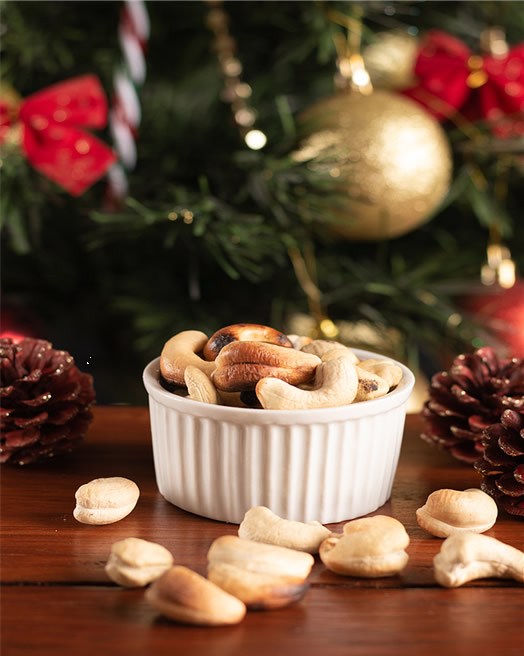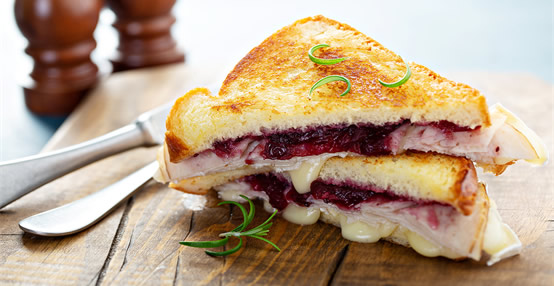Have Yourself a Healthier Christmas
The Christmas period is, for many, a favourite time of the year. However, a lot of the good things associated with Christmas, can unfortunately take their toll on your health. It’s important to counteract the effects of these ‘luxuries’, while still being able to enjoy them.
In this article, we make suggestions of how to maximise your health and minimise weight gain over the festive period.
Consider those calories

Consider healthier Christmas snacks, such as dried fruit or nuts.
We all know that Christmas is a time for family, for giving, for warmth and cheer, but it’s also a time for eating and drinking… and lots of it! One of the reasons many of us gain weight over Christmas is purely because of overindulgence, accompanied by too little physical activity. Quite simply, if you are taking in more calories than your body needs, any leftover calories will be stored as fat. The ‘broad brushstrokes’ recommendation for daily calorie intake is 2000 calories for a woman and 2500 for a man. For the big Christmas day meal alone, research has shown that some people consume around 3000 calories or more! This huge influx of calories not only causes weight gain, but can result in unpleasant side effects, such as indigestion. This can be experienced in the form of heart burn, where stomach acid escapes into your oesophagus causing a burning sensation in your chest and throat. Rather than attempt to eat a mammoth-sized Christmas meal all at once, instead have a normal sized portion then take a short break from eating (around 10-20 minutes). You can then decide to eat some more if you are hungry, or save the rest for later.
In addition to the big Christmas meal, there always seems to be plenty of tasty treats and tempting bites to eat lying around, especially lots of high calorie snacks that are not normally part of your everyday diet. High calorie snacking is another route to pushing you over your recommended daily calorific intake. This year, before reaching for those tempting treats, stop and think. Consider interspersing the mince pies and chocolates, with healthier alternatives such as dried fruit, nuts, and seeds. Try and ween yourself off the high-sugar content foods all together as soon as you can, after the big feast day is over!
Many people neglect to eat enough fruit over the Christmas period, as this is not a staple of the Christmas menu. However, it is important to keep your vitamin levels up, which will help to counteract the effects of late nights and overindulgence. Try and have at least one portion of fruit or vegetables with breakfast, lunch, and dinner, and ensure you’re reaching your five (or more) portions a day.
Food hygiene

Got to love a leftover turkey, grilled cheese and cranberry sauce sandwich!
Not to alarm you, but the Food Standards Agency reports that December sees the highest number of cases of food poisoning!
To prevent an upset stomach this Christmas, it is recommended that you don’t leave food out of the fridge for extended periods of time. Aim to eat leftovers within two days of them being initially cooked, and observe use by dates.
If you are using a frozen turkey, make sure you defrost it fully in the fridge (never in a warm room). Allow 12 hours per kilo, so two days for a 4-kilogram turkey for example. Refrain from washing your turkey (which is commonly suggested on YouTube), as this spreads bacteria around instead of eliminating it (any bacteria on your turkey will be killed by the heat of the oven anyway).
Stress less
If you are hosting Christmas, the additional work and organisation involved can easily make you feel overwhelmed and make the experience stressful. If you feel like things are getting out of hand, perhaps take a step back and put things into perspective. Taking a moment just to pause can help you to reset and interrupt your thoughts from spiralling and catastrophising. It is not worth ruining your day over a burnt dish or a messy room. People would much rather you were happy and relaxed.
Make to-do lists, prepare as much as you can in advance, for example, many dishes/sides/vegetables can be made in advance and then frozen. Ask for help – you don’t need to do everything on your own – delegate, delegate, delegate!
Don’t turn into a couch potato

Keeping active is key over the Christmas period, both physically and mentally.
Keeping active is key over the Christmas period, both physically and mentally. It is easy to structure your days around the TV guide, and sitting and eating. Instead, get out and do some exercise – even a walk will do you good. Movement will help you digest your food, burn off calories, increase circulation, improves mood, reduces stress, and much more.
Don’t forget to exercise your brain too! If you are sharing Christmas with others, try and make a change from watching TV and instead pull out some old fashioned board games, quizzes, and card games. These are a good way to engage your brain and keep you mentally sharp. It also encourages conversation and laughter, which has mood boosting benefits and reduces stress. Puzzles are another fun mental activity you can do alone, or with others. They enhance problem-solving skills, boost your mood, and improve teamwork skills, to name but a few.
Hydration
Don’t forget to stay hydrated. This will not only help with reducing snacking and alcohol consumption, but it also supports the digestion of food and speeds up the elimination of toxins and waste from the body. Aim to drink about 6-8 glasses (1.5 litres) of water per day.
A moment on the lips, a lifetime on the hips

Sparkling cranberry mocktail— a fun drink without the alcohol hit.
Well, that’s not quite true! But excessive alcohol consumption is another way you can easily surpass the recommended number of calories over the Christmas period. Those alcohol units can really start to make the calories add up!
Drinking alcohol increases the calories you consume, and puts your liver under a considerably higher workload. For example, a pint of beer contains around 200 calories and, to burn this off, you would need to do 20 minutes of running. If you prefer wine, 3 glasses would give you 480 calories and would require 50 minutes of running to burn it off.
Try to keep within the recommended weekly limits of alcohol consumption: 14 units of alcohol per week for both men and women. For reference, a pint of beer and a glass of wine are just over 2 units each. Avoid drinking on an empty stomach and consider drinking a non-alcoholic drink in between every alcoholic drink. There are also plenty of low-alcohol or alcohol-free wines/beers/spirits available now, so maybe try some of those instead. An alcohol-free mocktail is a fun way to enjoy a drink, without taking the calorie and alcohol hit.
Look after your immune system
This year more than ever, it’s important to look after your immune system. You can achieve this by following all the advice above; that is, maintaining a healthy diet, eating plenty of fruits, vegetables, nuts and seeds (so eat your Brussel sprouts!), limit your sugar intake, exercise for 30 minutes each day, keep hydrated, try to keep stress levels low, and avoid immune suppressants, such as smoking or excessive drinking.
Get good-quality sleep
There are all-round, multiple, far-reaching health benefits of sleep, so why wouldn’t you prioritise it? It has been shown that sleep is a critical physiological process that influences a wide range of important bodily functions: sleep makes you live longer, enhances your memory and makes you more creative. It makes you look more attractive, keeps you slim, and lowers food cravings. Sleep protects you from cancer, wards off dementia, lowers your risk of heart attack and stroke, and helps your immune system. You’ll have more energy, feel happier, and be less depressed and less anxious. So prioritise sleep this Christmas!
We wish you a Merry Christmas, and all the best for the New Year!
From the team at the Lloyd’s Wellbeing Centre








